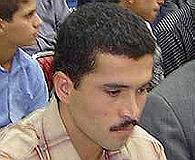March 16, 2005
(AP) A young man convicted of raping
and murdering 16 boys was lashed 100 times, and then
hanged Wednesday in front of a large, angry crowd who
pelted him with stones and scuffled with police.
Mohammed Bijeh, 23, confessed in
court to raping and murdering the children, between
March and September 2004. Iranian media have said Bijeh
burned the bodies of his victims, all boys between 8 and
15.
Bijeh was sentenced to one death
sentence for each murder he confessed and 100 lashes of
the whip for the rapes.
An accomplice, Ali Gholampour, was
acquitted of involvement in the murders but was
convicted of taking part in some of the kidnappings, to
which he confessed. He was sentenced to 15 years in
prison and 100 lashes.
Bijeh's verdict was carried out in
Pakdasht, a small, impoverished town about 19 miles
southeast of Tehran, after being upheld by the Supreme
Court. It was the same town where the murders took
place.
Approximately 5,000 spectators —
including women and children — gathered to watch the
flogging and hanging. Riot police circled the area.
Some in the crowd threw stones at
Bijeh as he was flogged, shirtless and hands tied to an
iron pole. He fell to his knees three times as he
received the lashes.
A relative of one of the victims
broke police security and attacked Bijeh with a knife,
wounding his back before police dragged him away.
After the flogging, a rope was put
around Bijeh's neck and attached to a hook on a crane.
The crane's arm jerked upward and Bijeh's body dangled,
drawing applause from the crowd.
Some people burst into tears, crying
out the names of their injured children. Some shouted,
"Shame on you, Bijeh!"
After about 20 minutes, the body was
lowered and a doctor confirmed Bijeh was dead.
Many in the crowd, some of them other
family members of the victims, repeatedly tried to
approach Bijeh's body but were prevented by riot police.
Scuffles continued for at least half an hour.
The case provoked national outrage in
Iran. Sixteen police officers were reprimanded for
dereliction of duty and the Interior Ministry criticized
the police for failing to catch the suspects after the
first crime.
Many of the people in Pakdasht
supported the hanging.
"Public executions reduce the
occurrence of offenses. Bijeh destroyed many families.
He deserved more than death," said resident Zahra
Khaleghi.
But Dariush Mehraban said public
hangings only promote violence.
"Many criminals have been hanged, but
offenses have never reduced. It's an ugly scene that a
human being is hanged even if he has committed many
crimes. Revenge is not the solution," said Merhraban,
who watched the hanging.
Convicts are hanged in public in Iran
only if a court deems that their offenses deeply
affected public sentiment.
Iranian courts are controlled by
hard-liners. Iranian reformists say public executions
hurt the country's international image and reflect badly
on Islam.

